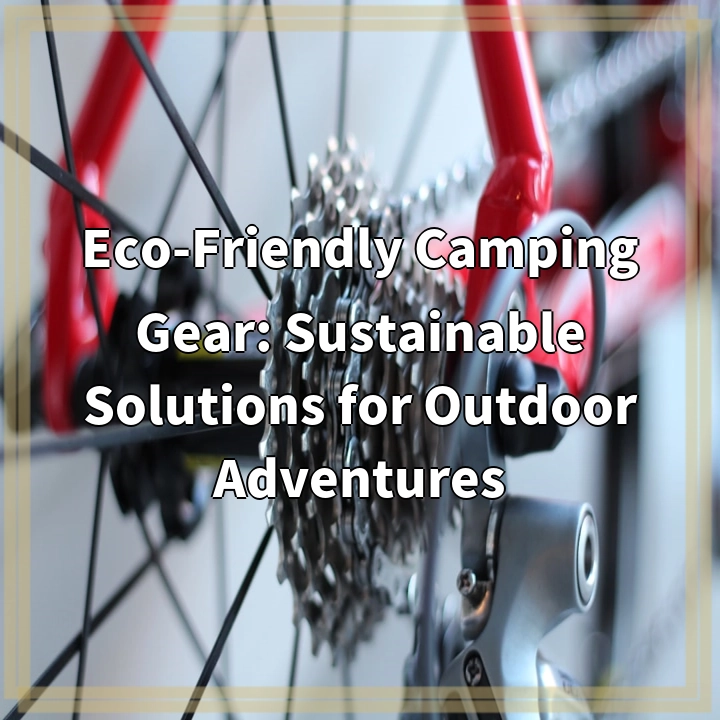
What is Eco-Friendly Camping Gear?
Eco-friendly camping gear refers to outdoor equipment and accessories that are designed with sustainability in mind. These products are crafted using environmentally friendly materials, have a minimal impact on the environment during production and use, and are often designed to be durable and long-lasting. From tents made with recycled materials to eco-conscious camp stoves and water filters, there is a wide range of gear available for eco-conscious outdoor enthusiasts.
Real-World Problems Associated with Conventional Camping Gear
While traditional camping gear may offer convenience and functionality, it often comes with significant environmental drawbacks. Here are some of the real-world problems associated with conventional camping equipment:
1. Waste and Environmental Impact
Many mainstream camping gear items, such as single-use plastic water bottles, disposable cutlery, and single-use propane canisters, contribute to plastic waste and take a toll on the environment. Additionally, the production and disposal of conventional camping equipment can generate greenhouse gas emissions and contribute to habitat destruction.
2. Chemical Pollution
Some camping gear may contain harmful chemicals, such as flame retardants and PVC, which can pollute ecosystems when they make their way into water bodies or soil. These chemicals can have detrimental effects on the environment, including soil degradation and harm to wildlife.
3. Limited Durability and Planned Obsolescence
Conventional camping gear is often designed for short-term use and may not withstand harsh weather conditions or frequent outdoor adventures. This limited durability leads to a cycle of constant replacements, generating more waste and consuming additional resources.
4. Resource Consumption
The production of conventional camping gear often requires significant amounts of non-renewable resources, such as petroleum-derived plastics and metals. This contributes to the depletion of finite resources and amplifies the ecological footprint of outdoor enthusiasts.
5. Disruption of Natural Aesthetics
Conventional camping gear can detract from the natural beauty of the outdoor spaces we aim to enjoy. Brightly colored synthetic tents, plastic camping furniture, and other non-biodegradable items sometimes diminish the serenity and visual integrity of the environment.
By recognizing and addressing these real-world problems, eco-friendly camping gear provides a sustainable alternative that allows outdoor enthusiasts to minimize their environmental impact while still enjoying the great outdoors.

Solutions: Embracing Eco-Friendly Camping Gear
Recognizing the environmental challenges posed by conventional camping gear, it’s important to explore sustainable solutions that allow outdoor enthusiasts to minimize their ecological footprint. Here are some ways to embrace eco-friendly camping gear:
1. Choose Sustainable Materials
Opt for camping gear made from eco-friendly materials such as recycled polyester, organic cotton, or sustainably harvested wood. These materials have less impact on the environment during production and disposal.
2. Invest in Durable and Long-Lasting Gear
Prioritize gear that is built to withstand outdoor conditions and offer long-term use. This reduces the need for frequent replacements and minimizes waste generation.
3. Opt for Reusable and Multi-purpose Items
Choose reusable alternatives for single-use camping essentials, such as water bottles, cutlery, and food storage containers. Look for multi-purpose gear that can serve multiple functions, reducing the need for additional equipment.
4. Support Ethical and Eco-Conscious Brands
Research and choose camping gear from companies that prioritize sustainability, ethical production, and environmental responsibility. Look for certifications, such as Fair Trade or GOTS, to ensure the products meet established standards.
5. Practice Leave No Trace Principles
Follow Leave No Trace principles to minimize environmental impact during outdoor adventures. This includes properly disposing of waste, respecting wildlife and vegetation, and leaving natural spaces as they were found.
6. Repair and Upcycle
Instead of discarding broken or worn-out gear, consider repairing or repurposing it to extend its lifespan. This reduces waste and helps conserve resources.
By adopting these solutions and incorporating eco-friendly camping gear into our outdoor adventures, we can contribute to the preservation of natural spaces and enjoy the splendors of nature more responsibly.















